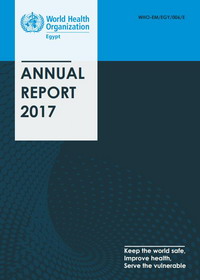 Read the report
Read the report
8 August 2018 – The WHO country office in Egypt works in partnership with the Government of Egypt and various national and international partners to ensure the highest attainable level of health for all citizens of Egypt, including the health needs of Syrian refugees in the country.
This report highlights the work of WHO and its key achievements in Egypt in 2017 in addressing priority areas of public health:
- health systems strengthening towards universal health coverage (UHC);
- promoting health through the life course;
- noncommunicable diseases; communicable diseases; and
- preparedness, surveillance and response to health emergencies.
In Egypt, UHC has been identified as a priority objective for health sector development. Egypt’s constitution of 2014, article 18, has put the country on track for progressing towards UHC, while the newly endorsed Social Health Insurance law established the legislative mechanism to fulfil the constitutional mandate and will be an important instrument to make UHC a reality.
WHO continued its collaboration with the Government of Egypt to protect and promote the health, safety, and well-being of the Egyptian population throughout their lifetime: from conception to old age. The prime area of work in 2017 was to support reproductive, maternal, newborn, child and adolescent health while focusing on addressing the main causes of maternal, neonatal and child mortality.
Recognizing NCDs as a rapidly growing, serious health and economic burden for the country, WHO supported Egypt’s efforts to address this public health problem by developing and implementing multisectoral national plans for NCD prevention and control. In addition to other relevant plans such as cancer control, mental health and disability health plans and tobacco control.
The WHO country office in Egypt collaborated with the Ministry of Health and Population in key areas to strengthen its prevention and treatment efforts of hepatitis C virus with the goal to eliminate hepatitis by 2020. Areas of support included the development of hepatitis surveillance and infection control training, and support for the provision of affordable treatments. WHO is also supporting the establishment of a national call centre to directly link community and health authorities for patient inquiries and treatment outcomes.
The WHO country office focused on strengthening country capacities in prevention, preparedness and response capabilities, in compliance with the International Health Regulations (IHR 2005), for all types of hazards, risks and emergencies that pose a threat to human health.
Coordination with national partners, including private sector and civil societies, was key to the success of important public health programmes such as hepatitis C prevention and control and UHC through the endorsement of the Social Health Insurance law. WHO also actively supports the UN Resident Coordinator’s mission in Egypt and promotes the “One UN” approach to maximize support to the Government of Egypt.
Related report
Annual report 2017
 Read the report
Read the report
8 August 2018 – The WHO country office in Egypt works in partnership with the Government of Egypt and various national and international partners to ensure the highest attainable level of health for all citizens of Egypt, including the health needs of Syrian refugees in the country.
This report highlights the work of WHO and its key achievements in Egypt in 2017 in addressing priority areas of public health:
- health systems strengthening towards universal health coverage (UHC);
- promoting health through the life course;
- noncommunicable diseases; communicable diseases; and
- preparedness, surveillance and response to health emergencies.
In Egypt, UHC has been identified as a priority objective for health sector development. Egypt’s constitution of 2014, article 18, has put the country on track for progressing towards UHC, while the newly endorsed Social Health Insurance law established the legislative mechanism to fulfil the constitutional mandate and will be an important instrument to make UHC a reality.
WHO continued its collaboration with the Government of Egypt to protect and promote the health, safety, and well-being of the Egyptian population throughout their lifetime: from conception to old age. The prime area of work in 2017 was to support reproductive, maternal, newborn, child and adolescent health while focusing on addressing the main causes of maternal, neonatal and child mortality.
Recognizing NCDs as a rapidly growing, serious health and economic burden for the country, WHO supported Egypt’s efforts to address this public health problem by developing and implementing multisectoral national plans for NCD prevention and control. In addition to other relevant plans such as cancer control, mental health and disability health plans and tobacco control.
The WHO country office in Egypt collaborated with the Ministry of Health and Population in key areas to strengthen its prevention and treatment efforts of hepatitis C virus with the goal to eliminate hepatitis by 2020. Areas of support included the development of hepatitis surveillance and infection control training, and support for the provision of affordable treatments. WHO is also supporting the establishment of a national call centre to directly link community and health authorities for patient inquiries and treatment outcomes.
The WHO country office focused on strengthening country capacities in prevention, preparedness and response capabilities, in compliance with the International Health Regulations (IHR 2005), for all types of hazards, risks and emergencies that pose a threat to human health.
Coordination with national partners, including private sector and civil societies, was key to the success of important public health programmes such as hepatitis C prevention and control and UHC through the endorsement of the Social Health Insurance law. WHO also actively supports the UN Resident Coordinator’s mission in Egypt and promotes the “One UN” approach to maximize support to the Government of Egypt.
Related report
Annual report 2017










